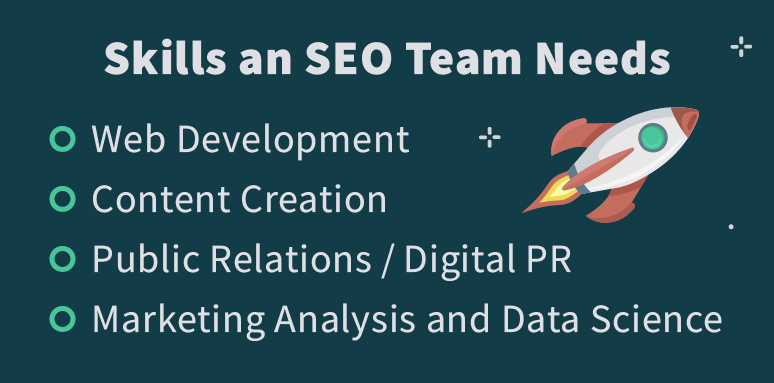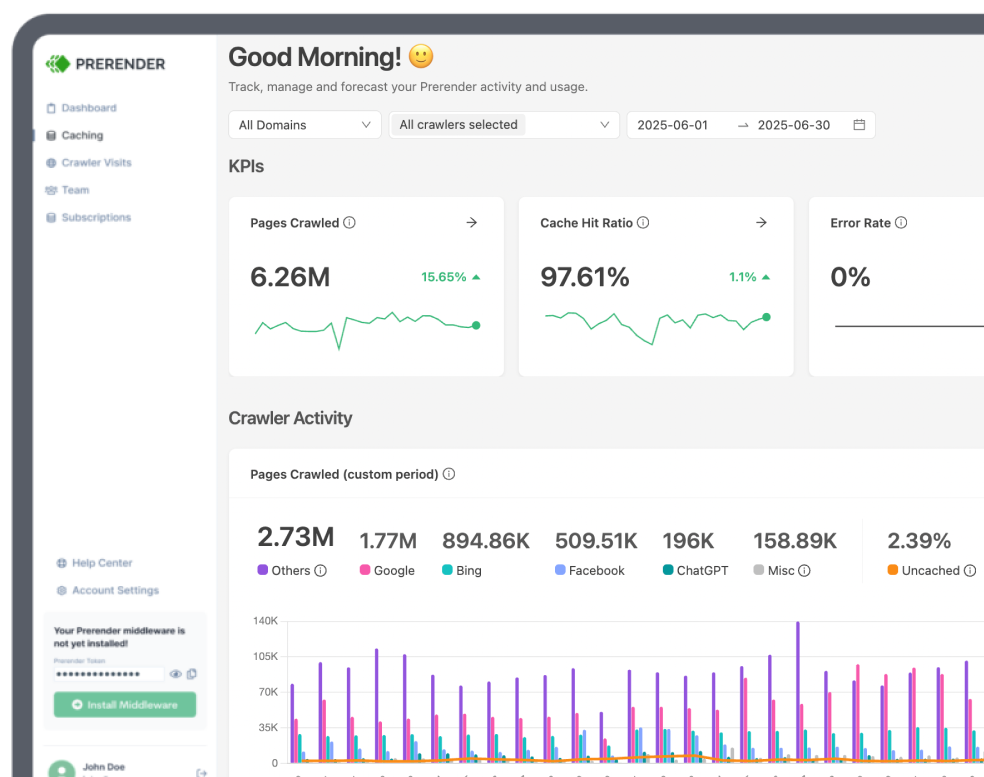Search engine optimization, commonly known as SEO, is one of the most important investments your business can make.
Done right, SEO is a marketing channel that can produce months or years of sustainable and expanding ROI.
A successful SEO campaign requires a lot of careful planning and execution. It isn’t the kind of thing you can hand over to just anyone, which is why it’s a skillset in such high demand.
SEO experts are competent, knowledgeable, efficient, and capable of distilling the bigger picture into its component parts. The ideal SEO manager takes ownership of his or her work, is accountable for mistakes, and shows, step-by-step, how to achieve the best possible results.
Having these capabilities in-house can be a huge advantage for your company.
When you onboard your own SEO team to support your marketing department, you can carefully pick and choose the right people to help you. You no longer need to rely on agencies that can’t guarantee results or freelancers who are noncommittal or use questionable methods.
Naturally, there is a significant upfront cost to recruit, train, and fully onboard SEO professionals—but it’s well worth the risk and effort if done right.
Here are the benefits of moving your SEO in-house, the skills to look for in your new hires, key positions to fill, how to structure your team, and how to manage your SEO A-Team once it is assembled.
Why Move Your SEO In-House?
We get it. Building and training your own SEO team can take months, far longer than just hiring an agency with turnkey services. On the surface, achieving an ROI with SEO can appear daunting. But here are some of the long-term reasons that make it worthwhile.

Familiarity With Your Business
You know your product or service better than anyone.
Hiring an agency still involves onboarding and training. Even though you have the team, it will take time for the SEO experts to become familiar with your processes. Moving your SEO in-house allows you to fill your SEO bench with people already knowledgeable about your product or service.
An in-house SEO expert also knows your specific business needs in ways that an agency or an independent contractor doesn’t. Your in-house expert can therefore tailor your SEO strategy accordingly.
Hiring an agency or a freelancer can quickly turn into a headache. When you hire your own SEO personnel, you know exactly what you’re getting and are fully in control.
You Get A Dedicated SEO Team
An SEO agency has to balance your priorities and needs with those of dozens of other clients. They can’t always be there for you when you need them.
An in-house SEO team, on the other hand, will work around the clock for you and only you.
Faster Execution
Using an SEO agency can mean a slow turnaround while they are familiarizing themselves with your product or service. They need to get acquainted with the ins and outs of your website and make an appropriate SEO strategy for it.
With an in-house team, a quick Zoom call or huddle in the conference room is usually enough to get the ball rolling. Flowing from ideation to execution is much more streamlined—and there are far fewer communication barriers.
Cost-Efficient In the Long Run
An SEO agency might excel at fast, on-the-spot results or provide ongoing website maintenance, but it will typically cost thousands of dollars a month.
When you move your SEO efforts in-house, you get the most value for your investment. Everyone on the team is dedicating his or her time and resources to the overall business. Moreover, it’s easier for them to collaborate with your content, social media and pay-per-click (PPC) teams, maximizing the value of your SEO efforts and investments.
Hire People You Trust
SEO agencies can be a mixed bag. It’s possible they may use dishonest business practices and some may even employ SEO that’s ineffective, at best, and black hat, at worst. Horror stories of offshore SEO efforts are all too common, with agencies providing low-quality links that can be counterproductive to your overall strategy.
Hiring in-house SEO gives you full control over the people who work for you. You can hand-pick SEO professionals with verifiable skills and qualifications.
Skills an SEO Team Needs
Here are a few skill sets that your SEO team is going to need for them to get the job done.

Web Development
It’s an SEO expert’s role to instruct web developers on how to make websites better. Every SEO professional should be familiar with front-end web development languages, like HTML and CSS. They don’t have to be web developers themselves, but they need to know enough to look at a website’s source code so they can identify problems and solutions. Ideally, you should have at least one SEO professional with a formalized background in web development.
SEO experts should have an eye for bloated or unused code, render-blocking styles and scripts, and unnecessary or unused pages or widgets that bog down your web pages or divert organic traffic. You want your SEO team to point visitors to pages that give your business a positive ROI.
Content Creation
SEO and content marketing should be working together to complete an inbound marketing cycle that attracts, engages, converts and delights.
Content strategy needs to be informed by keyword research. Your customer’s first digital touchpoint with your brand will likely be the top-of-funnel content that’s optimized for the long-tail SEO keywords you’re trying to target.
Have at least one person on your team who’s a skilled content writer.
Public Relations/Digital PR
Job titles related to digital PR usually refer to link building—reaching out to webmasters and editors and convincing them to link back to your website.
Link building is the most effective way you can make your website rank for your target keywords and bring traffic and authority over time. It’s also highly difficult because it’s an off-page SEO metric you don’t control.
Link building requires more than just a creative spirit (content creation) or an analytical mindset (web development or technical SEO). Expert link builders need to have thick skin, high levels of self-confidence, extremely strong interpersonal skills, and high levels of emotional intelligence. Finding this mix of personality traits and skills isn’t easy.
At least one person on your team should have a background in PR. Someone with prior experience in sales or journalism could be a good fit for this role, too.
Marketing Analysis and Data Science
SEO is notoriously hard to quantify. But at some point, the head of your SEO team is going to have to walk into a boardroom and convince a panel of business executives that what you’re doing is making them money.
For this reason, at least one person on your team should be good with numbers. Consider adding a team member with a background in data science or statistics.
You need someone who can communicate the ROI value of your marketing campaign. That person should be able to set up your conversion tracking and make sure your Google Analytics account is configured properly. Ideally, he or she will also be able to set up your analytics dashboards and put together some charts and graphs to prove that what you’re doing is working.
How To Structure Your SEO Team And Fill Key Positions
Broadly speaking, your in-house SEO team structure should be arranged into three departments: marketing strategy, technical, and content. You can also add a project manager.
Marketing strategists can make sure the ship is sailing in the right direction. Marketers with a propensity for analytics and a solid technical understanding help your SEO team keep its shape. You’ll also need creatives to help with the content side of your efforts.
Strategy
This is the head of the operation. Common team lead job titles in this department include: Senior Digital Marketing Director, Director of SEO, Head of SEO, or even SEO Lead.
This leader is the person who communicates with the c-suite or company leadership on the SEO team’s behalf. He or she is the person in charge of putting together the “broad-strokes” SEO strategy and overseeing its execution, as well as picking which keywords to target.
Technical SEO
The technical SEO staff are the ones who construct the details of your website. Key positions here include Head of Technical SEO and Director of Technical SEO. SEO analysts are the junior technical SEO experts who report to the team lead.
Technical SEO experts spend their days looking at speed tests, comparing diagnostic reports, and looking through screens of code to make your website run fractions of a second faster. They do routine website site audits and monitor any crawl errors or ranking drops that can occur as a result of an algorithm update. They also make recommendations to the web developers on how to optimize the website, write documentation to support their conclusions, and continually test improvements to make sure they’re working as intended.
Content
The content group of your SEO team could be its own branch within the marketing department or a sub-branch of the SEO team. Key positions are Head of Content, Director of Content Marketing, and Lead Content Marketing Strategist. Content writers and content marketing consultants report to the leaders of this group.
The content team does the creative side of SEO. They write your company blog and optimize it for search engines by taking the keyword lists given to them by the strategy branch and churning out content pieces.
Project Manager
SEO team members have to work side-by-side with web developers and software engineers.
Marketers and engineers are known for butting heads in firms large and small. The project manager serves as the liaison between the developers and the marketing team. The project manager’s job is to make sure the SEO team and the web devs get along, work together, and complete projects on time. They communicate the SEO team’s recommendations to the developers and web designers.
How to Manage Your New SEO Team
After you’ve assembled your in-house superstar SEO team, you will need to manage them. Here are some guidelines for getting started.
Set Objective-First ‘SMART’ Goals And Communicate Them Frequently
Effective marketing strategies need to have action-oriented “SMART” goals prioritized in an objective-first framework. Start your campaign with a clear definition of what you consider to be success. What keywords do you want to rank for? How much organic traffic do you need to produce a positive ROI? What pages do you ultimately want to rank on the top of the SERPs for your given keywords?
SMART stands for:
- Smart
- Measurable
- Actionable
- Relevant
- Time-Bound
Have weekly SEO team meetings to make sure your team stays on schedule and proactively addresses any problems. Make meeting objectives clear and on-topic. Limit them to 30 minutes, if possible.
At your SEO meetings, give an overview of SEO initiatives and go around the group so that team leads can keep you updated on their progress. Conclude your meetings with action items for the next meeting.
Delegate and Empower
Your team members are smart. In most cases, they’ll usually figure out what to do on their own.
Experienced SEO professions have to be smart and capable and dedicated to get to where they are. They don’t need micromanaging. Provide broad, but well-defined, expectations and trust your team members to execute them.
However, even the best SEO squad will need occasional guidance. Offer yourself as a resource if they run into problems, issues, or need clarification.
The Right Tools for the Job
The best SEO teams will have a working knowledge of a lot of specialized tools. Your SEO team needs those tools to be good at their jobs.
Here are a few tools you’ll need to have:
- Screaming Frog: an SEO spider and website crawler that lets you see websites the way a search engine does. It also lets you diagnose and solve metadata issues, like truncated title tags, identify 4xx error codes, and 301 redirect chains.
- AHRefs: AHRefs is possibly the best backlink analysis tool on the market. With this tool, you can reverse-engineer your competitor’s link-building strategies and help define your content strategy.
- SEMRush: Your SEO team is going to work very closely with PPC advertisers, so they’re going to need SEMRush, a tool specifically made for SEM marketing. It’ll also help you track keywords rankings over time.
- CanIRank: CanIRank is the unsung hero of keyword research tools. This AI-powered software will give you a breakdown of how likely you are to rank for a given keyword. It also gives you a whole host of analytics to validate your SEO strategies with thorough keyword research and it gives you an action-item list of recommendations to implement.
Give Credit and Lead by Example
It’s one thing to say that you have a positive work culture, but you need actual systems and processes to make your business a fun, collaborative, and rewarding place to work.
Open a channel in your team Slack where people can give each other shout-outs for their achievements.
Did a recent optimization make it to “Page 1” for a target keyword? Way to go! The digital PR specialist just scored the website a sweet backlink. Nice!
You can also start using Bonusly to let your team give each other points for good work. Bonusly points can be exchanged for gift cards or PayPal rewards.
Working in a positive work environment makes work fun. A little validation can go a long way towards making your SEO team feel seen and appreciated.
You’re Good to Go
By now you should have the right people, the right structure, and the right management style to take your website into SEO success! To recap, here’s an overview of the top-level steps for building and managing an SEO team:
- Fill in key positions for SEO strategy, technical SEO, content, and project management.
- Hire people with a mix of web development, content creation, digital PR and analytics, and/or data science skills.
- Make objectives clear, set weekly meetings, invest in a suite of SEO tools and build a positive work environment.



